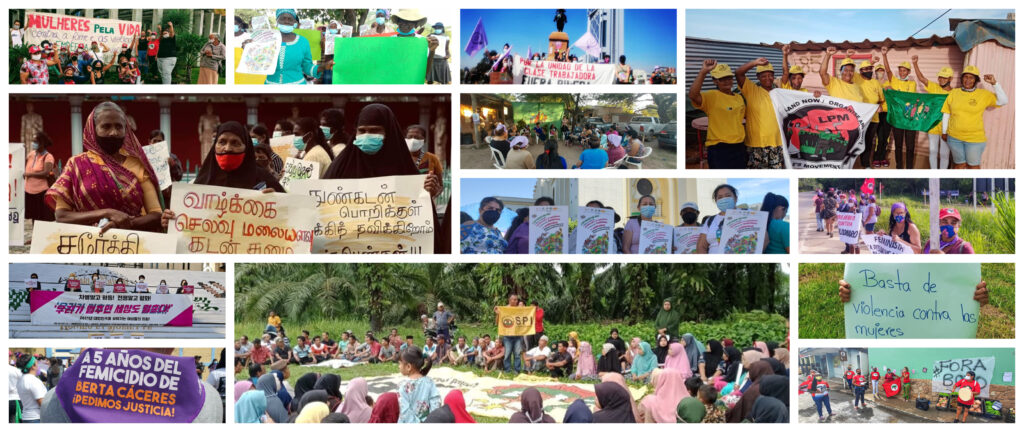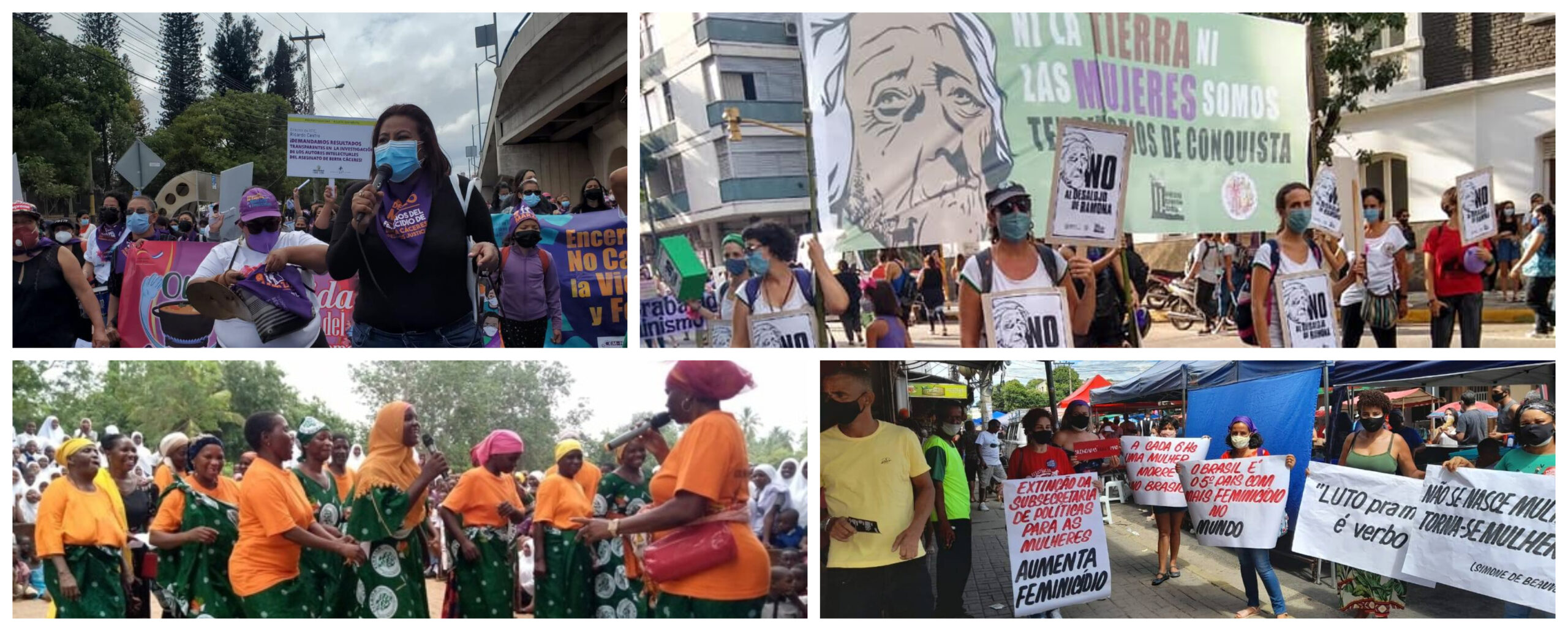Across the world, peasant and indigenous movements carried out solidarity actions to mark International Women’s Day on (and during the week of) the 8th of March 2021.

La Via Campesina had issued a clarion call to all its members worldwide by pointing out that to defeat the virus of patriarchy and capitalism, we need the vaccine of feminism and solidarity. Pastoralists, peasants, fisherfolks, agricultural workers, indigenous and landless people across member organisations responded positively to this call for solidarity this year. They organised peasant fairs showcasing diversities in food production and the work women and people of diverse identities do in the farms and inside rural social movements. Several solidarity actions that took place emphasised the urgent need for food sovereignty to positively address the crisis humanity is currently experiencing and transform our societies. Peasants also emphasised that the UN Declaration on Peasants’ Rights adopted in 2018 is a crucial tool to guarantee rights and gender justice in rural and urban communities.
With colourful marches, sit-ins, food donations, forums, meetings, and even blood donations, they showed the importance of feminism in the struggle against patriarchy and capitalism. We share a summary of the actions carried out by our LVC member organisations in different territories around the world.
AFRICA
Members of La Via Campesina’s Southern and Eastern African region organised local level workshops in 5 countries. These events brought together hundreds of women to hold dialogues on Peasant feminism and women’s struggle towards food sovereignty.
Tanzania, Mviwata
On International Women’s Day 2021, members of MVIWATA in Ruvuma, Mtwara and Shinyanga regions organised events to celebrate this special day. Besides the celebrations, MVIWATA also organised an online discussion with participants from various institutions, including Pan-Africanism Today (PAT), Kenyan Peasants League (KPL), and students from Sokoine University of Agricultural (SUA) to share experiences and exchange knowledge on women emancipation actions around the world. The discussions were broadcast live through MVIWATA Radio Station (FM 106.7 MHz).
South Africa, Landless People’s Movement
In South Africa, the women from the Landless People’s Movement joined hands with other women (from West Coast Food Sovereignty and Solidarity Forum, SAFSC, 1000 women, Ubuntu Rural Wen and Youth Movement) to celebrate International Women’s Day. They organised the actions in Lutzville, West Coast, South Africa.
Kenya, KPL
Kenyan Peasants League Women Collective (KPL WC) held meetings in three clusters (Mwende Munyanyau, Mariwa and Kangemi Clusters) to celebrate International Women’s Day. The sessions were attended by women from the nine KPL Clusters and focused on advocating for an end to gender inequality. Discussions also focused on the ongoing case study on Women Communal Land Rights and the Effects of Microcredit on Women.
Uganda, ESAFF
ESAFF Uganda organised women community dialogues in Iganga, Manafwa and Adjumani districts were 94 rural women came together to highlight the essential role of rural women, celebrate achievements, highlight the hindrances and discuss further actions for change. The outcomes of these dialogues are published.
ASIA
Indonesia
In South and West Sumatra, the women’s wing of Serikat Petani Indonesia held meetings with community women to discuss the country’s agricultural context and the impact of agrarian conflict on rural women. They also developed an action plan to give visibility to women’s contribution to the farm and the movement.
Thailand
Women farmers from the Northern Peasant Federation joined workers and activists demonstrating in defence of women’s rights. They also protested against high food prices and called for amendments to the Constitution to protect women’s rights. Assembly of the Poor also took part in actions that marked the day.
Japan
The Japan Farmers’ Federation lamented the fall in the purchase price of rice. They denounced the government’s attempts to implement an annual reduction in production, even as imports continue. In a video released to mark International Women’s Day, they demanded that the government distribute excess stocks to single parents and students who need support in the pandemic phase.
Srilanka
Women from peasant and rural families took action to denounce the exploitative practices of micro-finance companies. The demonstrations highlighted a never-ending debt crisis in villages across the country.
India
Thousands of women joined farmers’ protests on the outskirts of Delhi on Monday to mark International Women’s Day, demanding the scrapping of new laws opening up agricultural produce markets to private buyers.
Pakistan
Women held several marches and rallies across the country. During the pandemic, Pakistan has experienced a sharp increase in domestic violence cases, along with an increased burden of domestic and care work imposed on working women.
Malaysia
Women from the Indigenous Peoples’ Movement of Borneo (PANGGAU) met to discuss their agricultural situation. They also baked and sold moon cakes to raise funds for activities and events in the communities.
South Korea
The Korean Peasant Women’s Association echoed La Via Campesina’s international call for solidarity and adapted the mobilisation posters into local languages.
AMERICAS
Brazil
LVC Brazil’s member organisations carried out a series of actions from the 7th of March to the 14th. They celebrated women’s role in the Struggle for Life and Land and denounced the ruling government’s authoritarian tendencies. They demanded an end to all forms of gender-based violence. The women, through different actions, also called for vaccination for the whole population and emergency aid!
During the pandemic, class, race and gender inequalities have deepened further. The humanitarian tragedy went far beyond the virus and deaths: with increasing poverty and growing homelessness. There has also been an increase in women’s working hours and economic dependency. Women who attended several of the actions and meetings across Brazil brought out this aspect of care work that increased manifold during the pandemic. Solidarity actions took place in 17 states and the Federal District. One of the members, MPA, organised the first “Cultural of Resistance” of 2021 and with music and performances that reminded women’s role in societies.
Honduras
Five years after the femicide of Berta Caceres, the mobilisations demanded “justice for Berta, Keyla, Margarita and all those murdered in Honduras”. From 2005 to 2020, Honduras reported at least 6,405 murders of women and femicides. The demonstrations pointed out this alarming reality and emphasised that the legal system has largely failed to provide domestic violence survivors and victims justice. In 2020 alone, the 911 line registered 102,063 calls and 1,972 reports of violence.
Argentina
Women from MOCASE inaugurated the Women’s House of the Countryside and the City in Monte Quemado, north of Santiago del Estero.
Guatemala
Peasant Organisations Conavigua and CUC demanded an end to the criminalisation of women human rights defenders and justice for all girls, boys and women victims of kidnapping, rape and murder. They also remembered the grandmothers who have fought throughout history, demanding equal rights.
Nicaragua
Peasant members of ATC demanded the implementation of the Law for the Creation of a Fund for the Purchase of Land with Gender Equity for Rural Women to continue transforming inequalities in access to land use and land tenure. They also supported the National Roundtable’s advocacy actions for the Ratification of ILO Convention 190 and its recommendation 206 on violence and harassment in the world of work.
Chile
Peasant organisation ANAMURI joined forces with other feminist organisations and held marches and meetings to mark Women’s Day. The Pinera administration’s economic policies came under much criticism, and the participating women called for an end to this misrule. The organisations also held a forum titled “Struggles and Resistance for Food Sovereignty”.
SouthAmerica
Via Campesina South America and the Women’s Assembly of CLOC brought together almost one hundred participants from the region’s different organisations for an online meeting on the 5th of March.
USA
Dozens of women demonstrated yesterday, the 8th of March, in commemoration of International Women’s Day, to express their rejection of all forms of violence against border and migrant women in this binational region. Participants pointed out the increase in domestic violence experienced during COVID-19 and violence faced by peasant workers and migrant women in the farms and other spaces. In the US, nearly 3 million women have been pushed out of the workforce, disproportionately affecting non-white women already affected by wage inequality.
EUROPE:
Spain
On the occasion of International Women’s Day (8M), the Women’s Department of COAG and the Confederation of Rural Women (CERES) highlighted that it is more difficult for women-owned farms to access agricultural aid. According to data published by the Spanish Agricultural Guarantee Fund (FEGA), only 27.5% of women’s farms receive CAP aid. Women receive only 27.5% of direct aid and 26.34% of Rural Development aid. For all these reasons, COAG and CERES believe that it is essential to analyse the gender perspective in these two programmes to promote agricultural activity.
Meanwhile, the women farmers of Sindicato Labrego Galego, SLG, joined a strike. In terms of equality, the situation has only worsened for peasant women, they say. “We are still the invisible factor that sustains the rural world with our work on the farms, with our care for the elderly and the children. However, most of us still do not see this contribution recognised by acquiring any compensation or rights like most workers”.
Portugal
The Association of Portuguese Farming and Rural Women – MARP – a member of the CNA reaffirmed the right to produce quality food, which requires the appreciation of production prices. They called for support to peasant markets and fairs, privileged places for the sale of agricultural products. CNA also pointed out women’s role in food production, family farming and care, while lamenting their functions’ lack of visibility, division of work or recognition.
In France, the Confederation Paysanne issued solidarity with all the world’s women and expressed that it will continue to fight until women working on the farm obtain a status worthy of the name and stop being treated as second-class citizens.
In Romania, our member ECORURALIS translated the 8th of March poster proposed by LVC to disseminate it and include it in its campaign to raise awareness on women’s rights in rural areas. Ecoruralis took the opportunity to create a poster that publicises article 4 of the United Nations Declaration on the Rights of Peasants and Other People Living in Rural Areas. This article mentions the rights of rural women.
In Switzerland, our organisation Uniterre denounced the lack of recognition of women farmers on farms and highlighted the difficulty in accessing wages and social protection for the work they often do for free.

